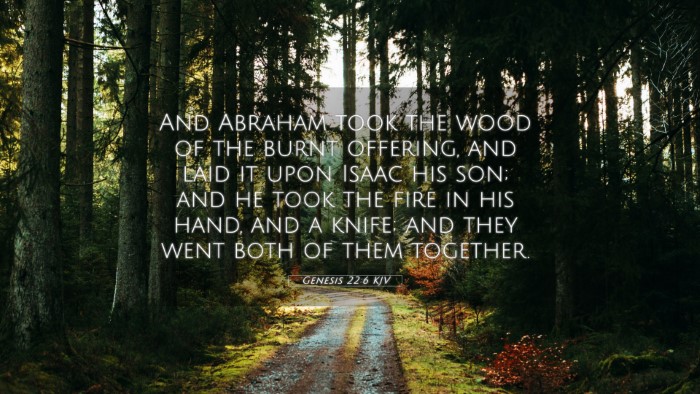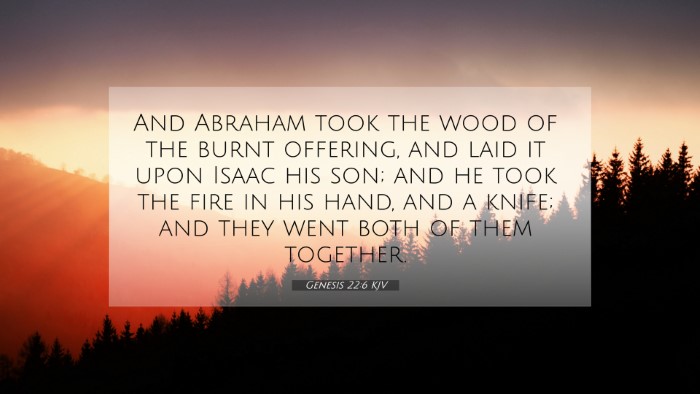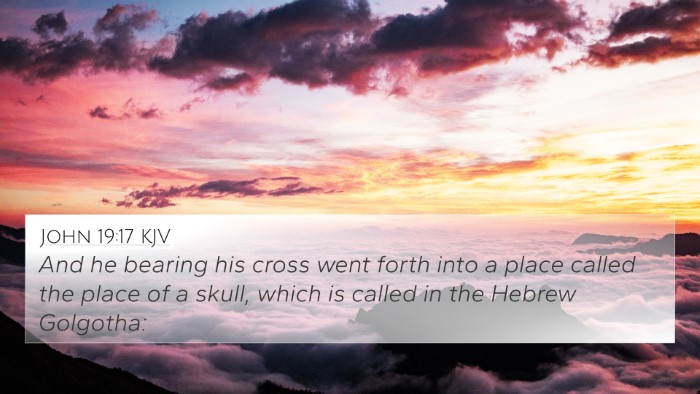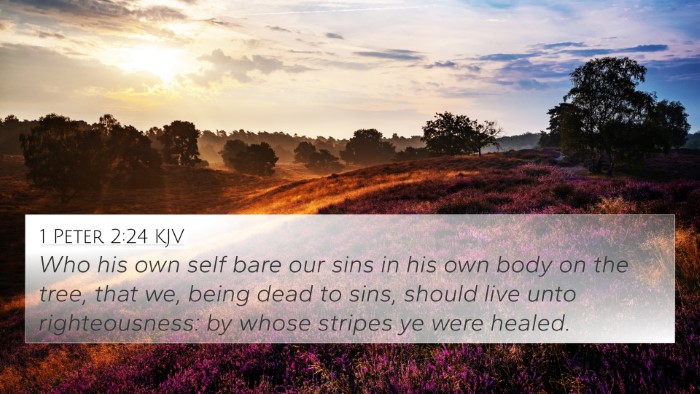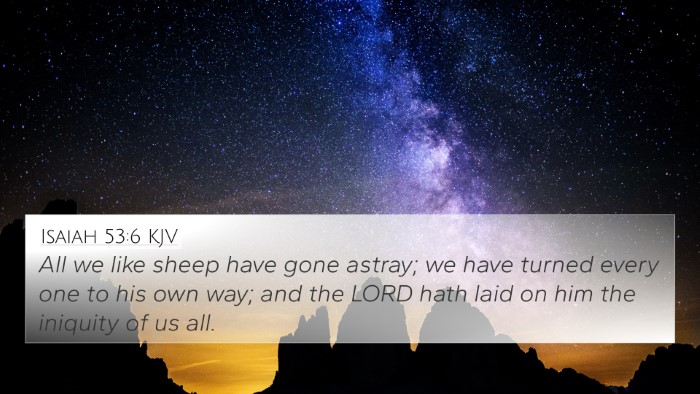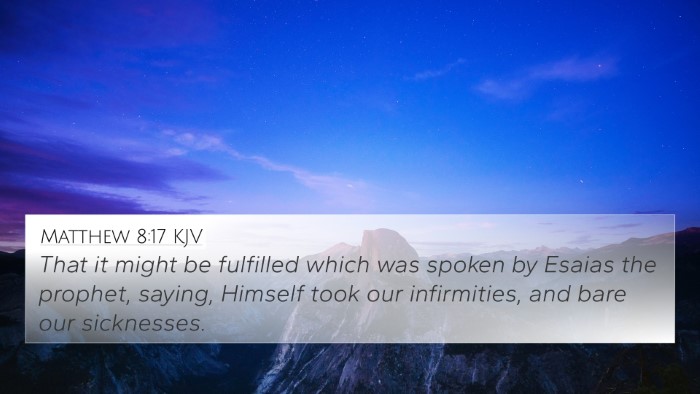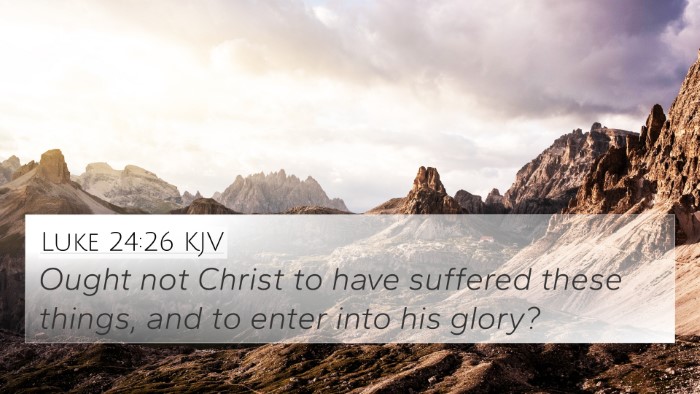Genesis 22:6 - Overview
In Genesis 22:6, we witness a pivotal moment in the biblical narrative where Abraham prepares to sacrifice his son Isaac in obedience to God's command. This verse reads:
“So Abraham took the wood of the burnt offering and laid it on Isaac his son; and he took in his hand the fire and the knife. So they went both of them together.”
This profound moment encapsulates themes of faith, sacrifice, and divine testing. Below is an analysis of the verse along with insights from various public domain commentaries.
Meaning and Interpretation
- Abraham's Preparation: Abraham's taking of the wood signifies not only physical preparation for the offering but also emotional and spiritual preparation. The act symbolizes dedication to God's will under extreme circumstances.
- The Significance of Isaac: Isaac represents the fulfillment of God's promise to Abraham. His participation in this sacrificial journey showcases not only Abraham's faith but also the trust Isaac has in his father.
- The Fire and Knife: The elements of fire and the knife symbolize purification and the act of sacrifice. This foreshadows the ultimate sacrifice of Christ, establishing a deep connection between the Old and New Testament.
- Unity in Their Mission: The phrase "They went both of them together" highlights the collaborative aspect of faith and obedience. Both Abraham and Isaac share this significant and daunting journey together, representing the unity of purpose in following God’s commands.
Insights from Commentaries
- Matthew Henry: He emphasizes the faith displayed by Abraham in this verse and discusses the foreshadowing of Christ as the sacrificial lamb. Henry elaborates on the emotional turmoil Abraham must have faced, balanced with unwavering faith.
- Albert Barnes: Barnes notes that Abraham's actions were an act of faith leading to a greater understanding of God’s provision. He asserts that the preparation reflects the seriousness of the covenant between God and Abraham.
- Adam Clarke: Clarke focuses on the literal details of the journey, the symbolism of the wood, and the implications for later interpretations of sacrifice in the Judeo-Christian tradition.
Bible Cross References
Genesis 22:6 is interconnected with several key verses throughout the Bible that provide deeper insights into its themes:
- Hebrews 11:17-19: Discusses Abraham’s faith in offering Isaac and God's ability to raise the dead, establishing the significance of faith in God's promises.
- James 2:21-23: Reflects on Abraham's justification by works, as he obeyed God's command to sacrifice Isaac, linking actions to faith.
- Romans 8:32: Connects to God’s willingness to give His own Son, drawing parallels between Abraham's sacrifice and God's ultimate sacrifice.
- John 3:16: This well-known verse underscores the theme of sacrificial love and the giving of a son, mirroring the narrative of Abraham and Isaac.
- Exodus 12:21-27: The Passover event, involving the sacrifice of a lamb, shares thematic elements of substitutionary sacrifice.
- Isaiah 53:5: Prophetic scripture that links to sacrificial themes, indicating that Christ was wounded for our transgressions.
- 1 Corinthians 5:7: Mentions Christ as our Passover lamb, furthering the connections between the sacrificial system and Christ’s sacrifice.
- Philippians 2:8: Reveals the humility of Christ in obedience to the point of death, echoing Isaac's submission to his father's will.
- Genesis 15:6: Highlights Abraham's faith being credited as righteousness, foundational to understanding his character and actions in Genesis 22.
- Matthew 26:39: Jesus' prayer in Gethsemane reflects a similar theme of wanting to avoid sacrifice yet being obedient to the Father's will, connecting the experiences of father and Son in profound ways.
Connections Between Bible Verses
The thematic connections and parallels among these verses signify an interwoven narrative of obedience, sacrifice, and faith throughout scripture:
- Thematic Relations: Both Genesis 22 and the New Testament emphasize obedience to divine will, where human understanding is often secondary to God’s plan.
- Inter-Biblical Dialogue: Genesis 22 initiates conversations surrounding sacrifice that reverberate through the Gospels, reflecting both Jewish tradition and Christian theology.
- Comparative Insights: The act of sacrifice in Genesis leads to an understanding of redemption in the New Testament, highlighting the full circle of spiritual significance.
Tools for Bible Cross-Referencing
Utilizing tools for cross-referencing enhances the study of the Bible:
- Bible Concordance: A resource that assists in locating specific words and themes throughout scripture to support studies.
- Bible Cross-Reference Guide: Provides connections between verses across both testaments to display thematic links.
- Cohesive Studies: Encourages a deeper understanding of each verse and its significance within the broader narrative of the Bible.
Conclusion
Genesis 22:6 serves as a powerful example of faith in action, sacrifice, and the profound implications for both Jewish and Christian understanding of obedience to God. The rich intertextual connections and thematic elements invite further exploration and reflection on the nature of faith, making it a pivotal part of spiritual and theological studies.

